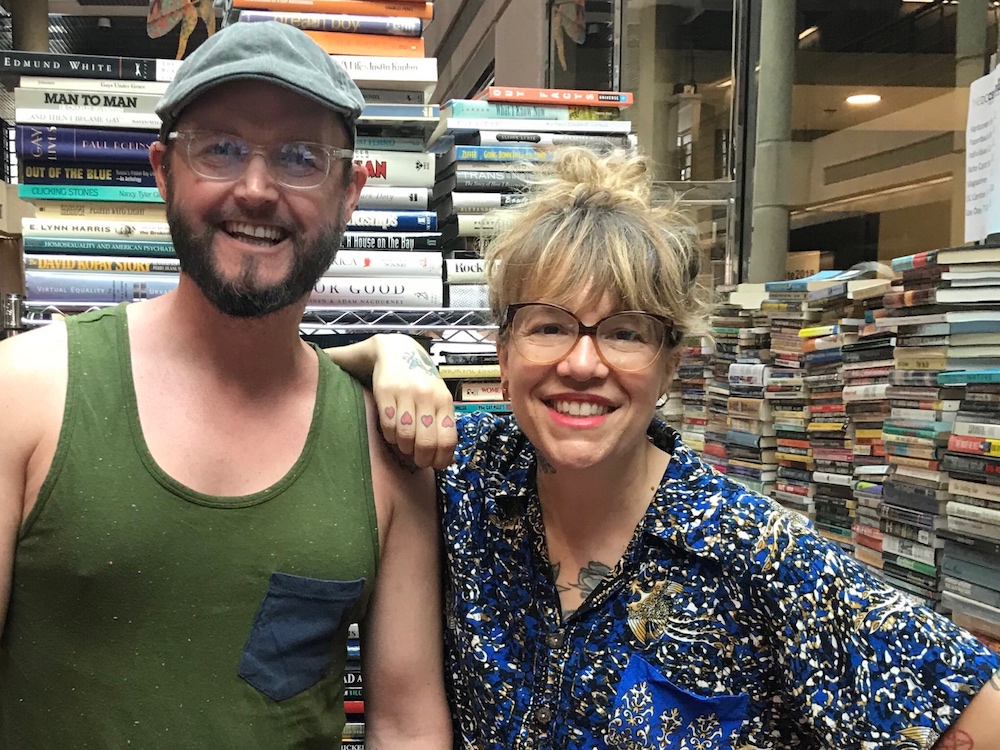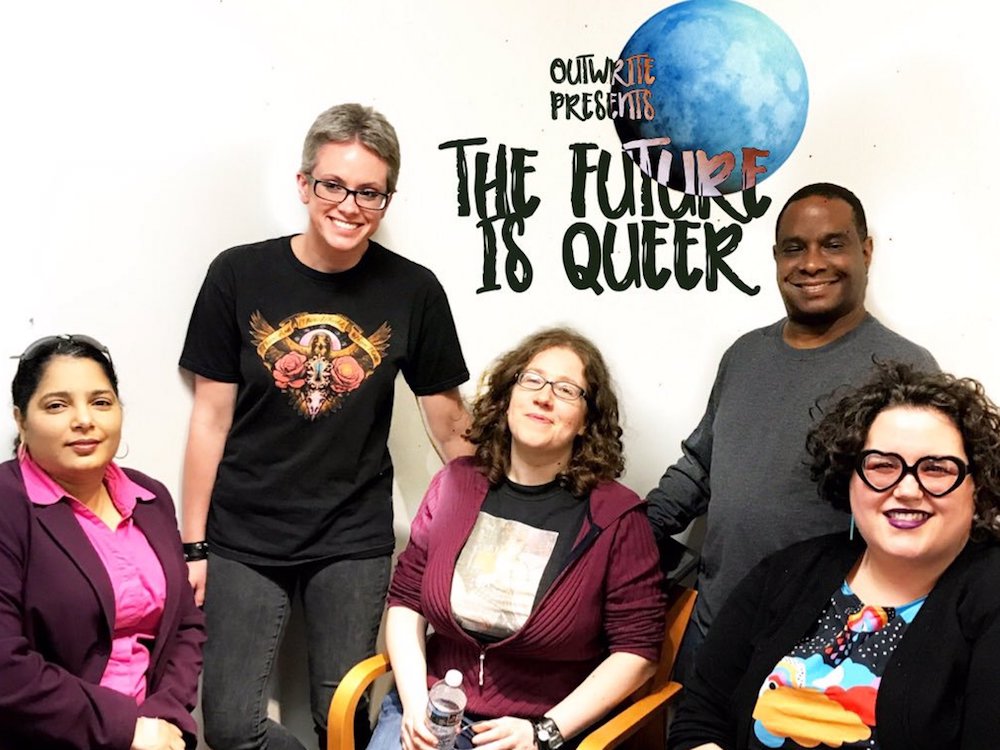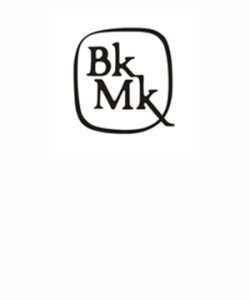East City Bookshop
East City Bookshop has become a gathering place for book lovers of all ages since opening in 2016. The friendly staff offers favorite book picks, and there are author events, book clubs, and community events throughout the year.

Jump to navigation Skip to content
East City Bookshop has become a gathering place for book lovers of all ages since opening in 2016. The friendly staff offers favorite book picks, and there are author events, book clubs, and community events throughout the year.

dave ring is the community chair of the OutWrite LGBTQ literary festival in Washington, D.C. He has been honored to receive fellowships and residencies from Lambda Literary, FutureScapes, DISQUIET, and the Sundress Academy for the Arts. Currently at work on a novel, his stories have been published or are forthcoming by GlitterShip, A Punk Rock Future, and the Disconnect. He is the editor of the anthology Broken Metropolis: Queer Tales of a City That Never Was published by Mason Jar Press. Follow him on Twitter at @slickhop.
 Currently I’m the community chair of the annual OutWrite LGBTQ literary festival, held annually on the first weekend in August in Washington, D.C. I inherited the position from Julie Enszer, the editor of Sinister Wisdom. Last year’s keynote speaker was activist and writer Michelle Tea, and the festival itself featured more than ninety authors, forty exhibitors, and a full day of readings and panels—all put on by volunteers.
Currently I’m the community chair of the annual OutWrite LGBTQ literary festival, held annually on the first weekend in August in Washington, D.C. I inherited the position from Julie Enszer, the editor of Sinister Wisdom. Last year’s keynote speaker was activist and writer Michelle Tea, and the festival itself featured more than ninety authors, forty exhibitors, and a full day of readings and panels—all put on by volunteers.
In addition to the annual festival, OutWrite holds a number of literary events throughout the year. Marianne Kirby, author of the novels Dust Bath Revival and Hogtown Market, organizes an annual speculative reading series in May at East City Bookshop that changes its name a bit each year. In 2017 we held the first reading, “The Future Is Queer,” with Craig Gidney, Sunny Moraine, Day Al-Mohamed, and Sarah Pinsker. In 2018 “The Future Is Still Queer” welcomed Na’amen Tilahun, K. M. Szpara, Ruthanna Emrys, and Marlena Chertock. 2019’s reading on May 4 will be called “The Future Is Still Very Queer” and features Rashid Darden, Nibedita Sen, and Lara Elena Donnelly.
Reflecting on the reading series, Marianne says, “Curating this series of readings focused on queer speculative fiction has been a tremendous reminder that queer identity by its very nature is speculative. When we create and share our visions of the future, we create radical art.”
 OutWrite events always remind me how beautiful and affirming representation is. Representation can become sanctuary in a reality that frequently erases, elides, or minimizes queer people’s existence, not only in relation to queerness, of course, but all the other identities that they carry with them. Honoring and showcasing those identities has been a gauntlet worth picking up.
OutWrite events always remind me how beautiful and affirming representation is. Representation can become sanctuary in a reality that frequently erases, elides, or minimizes queer people’s existence, not only in relation to queerness, of course, but all the other identities that they carry with them. Honoring and showcasing those identities has been a gauntlet worth picking up.
This year’s festival has three featured writers: Kristen Arnett, Jericho Brown, and Wo Chan. Themes include: faith and sexuality, exploring colonialism and diaspora-driven identities, the legacy of Stonewall, and the line between identity and commodity (particularly for writers of color). Friday, August 2 is our kickoff and on Saturday, August 3, we’ll have ten panels and twenty readings. The festival concludes on Sunday, August 4 with six writing workshops, open to both emerging and experienced writers. One of those workshops, “Culinary Speculative” led by Nibedita Sen, will explore the exciting intersection of worldbuilding and food. Please join us!
Support for Readings & Workshops in Washington, D.C. is provided by an endowment established with generous contributions from the Poets & Writers Board of Directors and others. Additional support comes from the Friends of Poets & Writers.
Photos: (top) dave ring and Michelle Tea (Credit: Phill Branch). (bottom) The Future Is Queer readers (Credit: dave ring).“In the tiny little notebook I took tiny little notes…. I wrote for one minute eight times throughout the first day. Eight times on the second day.” In Camille T. Dungy’s essay “Say Yes to Yourself: A Poet’s Guide to Living and Writing” in the May/June issue of Poets & Writers Magazine, the author writes about various writing routines, including one which consisted of writing for a small amount of time simply recording things that caught her attention. Try out this routine for several days—you might decide on one or two minutes throughout the day, or twenty—and note down sensory observations, and emotional and physical feelings. At the end of the experiment, write an essay inspired by a couple of your favorite observations.
This afternoon the winners of the 2019 Pulitzer Prizes were announced at Columbia University in New York City. The annual $15,000 prizes are given for works of journalism and literature published during the previous year. First awarded in 1917, the Pulitzer Prizes are considered among the most prestigious prizes in American letters.
The award in fiction went to Richard Powers for his novel The Overstory (Norton). The finalists were Rebecca Makkai for The Great Believers (Viking) and Tommy Orange for There There (Knopf).
Forrest Gander won the award in poetry for Be With (New Directions). The finalists were Jos Charles for feeld (Milkweed Editions) and A. E. Stallings for Like (Farrar, Straus and Giroux).
Jeffrey C. Stewart won the award in biography for The New Negro: The Life of Alain Locke (Oxford University Press). The finalists were Max Boot for The Road Not Taken: Edward Lansdale and the American Tragedy in Vietnam (Norton) and Caroline Weber for Proust’s Duchess: How Three Celebrated Women Captured the Imagination of Fin-de-Siècle Paris (Knopf).
The nonfiction award went to Eliza Griswold for Amity and Prosperity: One Family and the Fracturing of America (Farrar, Straus and Giroux). The finalists were Elizabeth Rush for Rising: Dispatches From the New American Shore (Milkweed Editions) and Bernice Yeung for In a Day’s Work: The Fight to End Sexual Violence Against America’s Most Vulnerable Workers (New Press).
David W. Blight won the award in history of the United States for Frederick Douglass: Prophet of Freedom (Simon & Schuster). The finalists were W. Fitzhugh Brundage for Civilizing Torture: An American Tradition (Belknap) and Victoria Johnson for American Eden: David Hosack, Botany, and Medicine in the Garden of the Early Republic (Norton).
Each year the Pulitzer Prizes receive nearly 1,400 submissions for its five book categories. The 2018 winners included poet Frank Bidart, fiction writer Andrew Sean Greer, and nonfiction writer Caroline Fraser.
Read more about Powers’s winning book in “A Talk in the Woods: Barbara Kingsolver and Richard Powers” from the November/December 2018 issue of Poets & Writers Magazine.
Photo: Richard Powers
In this video from the Wigtown Book Festival in Scotland, the Bookshop Band performs “Death to the Kindle” inspired by The Diary of a Bookseller (Melville House, 2018) by Shaun Bythell. English singer-songwriters Beth Porter and Ben Please compose music based on books and writers and are featured in News and Trends in the May/June issue of Poets & Writers Magazine.
What did you eat for breakfast this morning? Do you prefer a pastry and coffee, yogurt and fruit, cereal, or an egg sandwich? Perhaps you like something hearty to start the day like oatmeal porridge, fava bean stew, a rice dish, or noodle soup. Browse through photos of typical breakfast meals from around the world and write a personal essay about a favorite breakfast of your own. Think about specific memories associated with these meals, involving certain people or places. How have your breakfast foods and routines changed over the years?

Poet and memoirist Meghan O’Rourke, the incoming editor of the Yale Review, discusses her approach to editing, her plans for the journal, and the trends she’s most excited about.

The first lines of a dozen noteworthy books, including The Tradition by Jericho Brown and Orange World by Karen Russell.

The Kansas City, Missouri–based independent press approaches its fiftieth anniversary with plans to launch a chapbook competition in 2020.

A roundup of four new anthologies, including the third volume of the BreakBeat Poets series, Halal If You Hear Me, edited by Fatimah Asghar and Safia Elhillo.